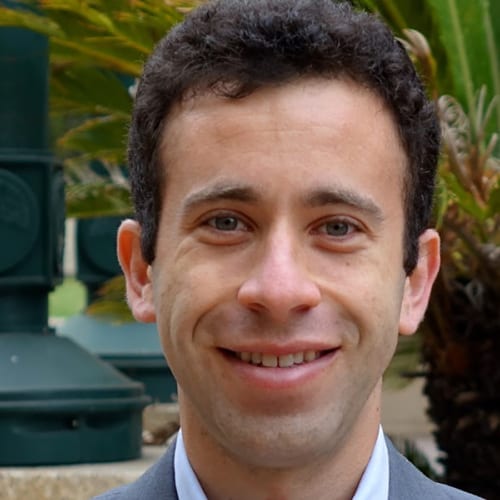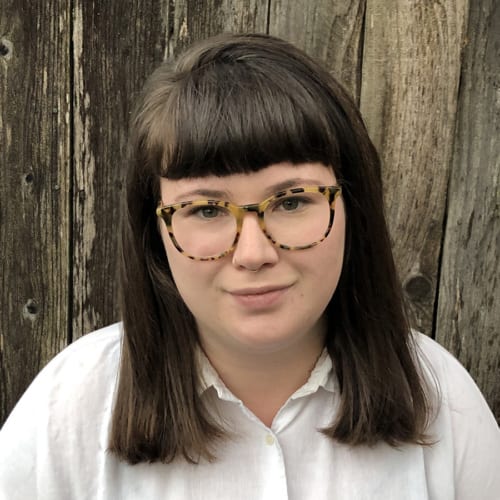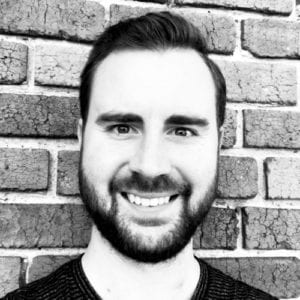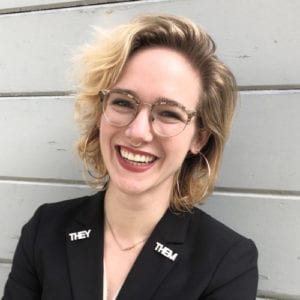By Andrew Cohen
Another year, another bumper crop of recent Berkeley Law alumni landing coveted Equal Justice Works Fellowships.
Matthew Bedrick, Tori Larson, Jay Cumberland, and Kel O’Hara—all of whom graduated on May 10—were among 76 new lawyers selected. Each designed two-year projects, funded by law firms, corporations, foundations, and individuals, with legal services organizations that help build sustainable solutions in their communities.

Bedrick will work the National Center for Youth Law, where he clerked after his 2L year. Sponsored by Cooley LLP, he will help immigrant children who are in federal detention or recently released obtain the education services they are entitled to and need to succeed in public schools.
“Many of these children have experienced extreme trauma—from fleeing violence and persecution in their countries of origin, to being separated from parents and family members at the border, to being harmfully warehoused in federal detention centers,” Bedrick says.
Before law school, Bedrick tutored, mentored, and advocated for students at risk of dropping out of school as an AmeriCorps member an education nonprofit in New York. At Berkeley Law, he improved children’s lives through work at the Youth Advocacy Project and the East Bay Community Law Center’s Education Advocacy and Youth Defender Clinics, as well as its Immigration Clinic.
Bedrick pushed for better academic programs in juvenile hall, helped a student complete his probation and graduate from high school, represented a student falsely accused in a school expulsion hearing, managed a full juvenile delinquency case for an immigrant student, and assisted undocumented students seeking to continue their education and stay in the U.S.
“I came to Berkeley Law for the school’s public interest and pro bono opportunities,” Bedrick says. “I was excited about getting to do impactful pro bono work during my 1L year.”
Humanizing homelessness
Larson will work at the Lawyers’ Committee for Civil Rights. Sponsored by the Pillsbury Foundation, she will serve the Bay Area’s homeless population through direct legal services, local policy advocacy, and community partnerships.

Larson became involved in homeless advocacy work through Berkeley Law’s chapter of the National Lawyers Guild. “I was and remain stunned by the legal profession’s inability to adequately address homelessness and disinterest in finding compassionate solutions that promote rights for those who are unsheltered,” she says.
Larson interned with groups that work with Bay Area homeless communities, including two semesters at Lawyers’ Committee for Civil Rights—her EJW host organization. She will focus on meeting the actual needs of homeless citizens while cultivating pragmatic strategies.
“Decriminalizing homelessness at the local level is going to be met with a lot of pushback from housed residents who have no interest in having homeless neighbors,” Larson says. “I need to work with those housed residents to find real solutions that work for everyone, and that will be challenging to say the least.”
Cooperative realignment
Cumberland will work for the Sustainable Economies Law Center, where he previously interned. Sponsored by the eBay Foundation, he will help Bay Area working-class communities of color anchor themselves against displacement by collectively purchasing their work and dwelling places.

Gaining insights about community economic development from several Berkeley Law clinical professors and alumni, Cumberland worked at EBCLC’s Community Economic Justice Clinic and learned about cooperatives during field placements and his SELC internship. His new project aims “to put workers and tenants at the center of the cooperative conversion story without ostracizing business owners and landlords from that story.”
Cumberland notes that co-op conversion narratives stress “the role of benevolent landlords and business owners in handing over apartment buildings to tenants and workplaces to workers. Changing the narrator of the cooperative conversion story is incredibly important.”
To achieve that, he will engage in purchase and sale negotiations that are “part standard business transaction and part restorative justice. Learning the skills needed to create and hold this space for clients will be challenging. It’ll hold me to a high standard as a person and a lawyer.”
Buoying survivors
O’Hara will work for Equal Rights Advocates. Co-sponsored by Intel Corporation and Munger, Tolles & Olson, they will expand support for LGBTQ student survivors of gender-based violence and harassment by bridging the gap between Title IX and queer youth justice through direct representation, outreach, and education.

O’Hara started focusing on campus sexual violence policies in college, and spent two years as a rape crisis counselor at Manhattan’s Bellevue Hospital before coming to Berkeley Law. There, they joined a student legal services project that addressed sexual misconduct by campus professors and held internships that bolstered support for sexual violence survivors.
As a 2L, O’Hara founded the Survivor Advocacy Project, which helps UC Berkeley survivors through the campus disciplinary process. They also did field placements at the Family Violence Law Center and Family Violence Appellate Project, expanding their understanding of civil legal response to interpersonal harm in California.
Among the many things O’Hara loves about Berkeley Law’s public interest community is “how many people … want to be the advocate they needed when they were younger. It points to a tremendous and tenacious sense of hope in the culture here—hope not only that change is possible, but also that we ourselves can be the ones to create it.”